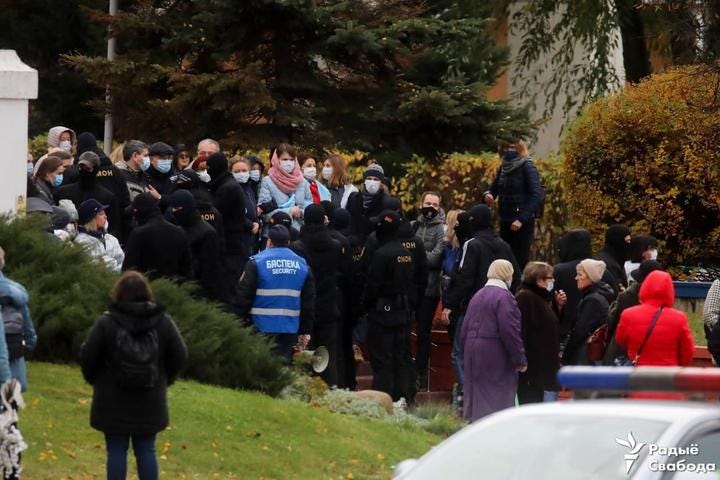“Is what we have done commensurate with the punishment?”
A well-known urologist oncologist about how he spent his imprisonment.

At the beginning of November, several dozen doctors were detained near the 1st hospital in the center of Minsk. Among them is a leading researcher at the Alexandrova Republican Scientific and Practical Center of Oncology Alexander Minich. During the trial, colleagues spoke of him as a unique specialist. The court’s verdict was 13 days of detention. During these detention days the doctor fell ill with coronavirus and after his release he “dropped out of medicine” for another two weeks. The doctor told TUT.BY about his days behind bars, his work and the publication of data on the website about the “unlucky children of the motherland.”
Court
Alexander Minich, Candidate of Medical Sciences, was tried under Article 23.34. A small dialogue that took place at the court session has made this process one of the most discussed.
“Alexander Anatolyevich is my deputy, he is a highly qualified specialist, the only and experienced laparoscopic surgeon. He performs minimally invasive operations of high complexity. And if he is in prison, we have no one to replace him, “ said the head of the urological oncological pathology laboratory of the Alexandrova Republican Scientific and Practical Center of Oncology Alexander Rolevich at the court session.
“Does anyone else know how to perform such operations?” said the judge Anastasia Achalova.
“At the level he does it, no,” replied the witness Rolevich.
“Well, in general?” continued the judge.
“It’s like a major and an amateur league. In general, it is possible, but the level will not be the same,” added the head of the laboratory.
Alexander Minich heard this conversation. He talks about his uniqueness as follows: laparoscopic operations in their department began to be performed 20 years ago. In laparoscopy, the doctor achieves the desired result with a smaller incision. As a result, the person recovers faster. Technically, these operations are more complex and require special skills from surgeons.
“After the first operations like these, laparoscopic operations in our department were performed extremely rarely over the next 10 years,” the doctor notes.
Why? At that time, there was not enough literature in this area, not enough financial opportunities for training abroad with experienced specialists, and there was also a lack of the necessary tools and equipment.
“After receiving my diploma, I worked as an urologist. It happened that in 2011 my brother almost died as a result of a serious disease. Thanks to the help of the friends, we were able to send him to Israel. My mother and I went there too to accompany him,” recalls the interlocutor.
“Having a good command of English, I have got acquainted with several urologists with extensive experience in laparoscopic operations. During my four months in Israel, I was able to complete internships in laparoscopic urology in four clinics. Later, after coming back to Belarus, I started using my new knowledge. At the same time, I continued studying particular features of laparoscopic operations: I trained in the other countries, including Israel.”

In the Aleksandrova Republican Scientific and Practical Center, there is no such thing that only one doctor does some kind of operation, the interlocutor says. The doctor can always replace his colleague.
“But now there are hundreds of such operations on my account, while the other specialists have dozens of them,” Alexander Minich explains and proceeds to an example. “I was detained on Saturday, and on Monday I had to perform laparoscopic kidney removal on a pregnant patient. From the special bus, while our phones had not yet been taken away, I called my colleague and asked to replace me if necessary. The colleague did it. I won’t say that it was some kind of super-complicated operation, but this was the first time this was done here. And if something went wrong, I would have more experience to get out of a non-standard situation.”
Detention Days
During 13 days, Alexander Minich managed to change three addresses.He visited the detention center in Okrestina Street, Mogilev, and the prison in Zhodino. Nothing terrible happened to him in prison, he says.

“There were six of us, doctors, who entered the cell in Okrestina Street: six people for six bunk beds. We were given mattresses and pillows. They didn’t give us bed linen, but there was hot and cold water in the tap,” the interlocutor describes the situation. “Later I was transferred to a three-place cell, with doctors too. Nobody showed violence towards us, but we had to follow the rules: during the day the mattresses should be rolled up, you shouldn’t lie on the bed, when you come out to the corridor you should stand facing the wall with your hands behind your back.”
In Zhodino, the doctor was initially placed in an eight-person cell. There were, however, 14 men here. Then he was moved to more comfortable conditions: a cell, where even after his arrival there were free “beds”.
“Unlike the first cell, there was food, books, lots of toilet paper, hygiene products,” the doctor says. “Personally, I still do not understand how at the same time and in one place there can be two so different cameras. By the way, in Zhodino every morning for two hours they played patriotic songs like “They don’t give up the beloved one”. I took it calmly, but many people perceived it as torture.”
Everyone Alexander was behind bars with was “political”. In Mogilev, he says, when he entered the cell, one of the guys joked: “I have always wanted to sit with a doctor.” One touching moment had happened here. Several men, with whom the doctor was sitting, received letters from unknown girls from Mogilev. Apparently, he suggests that the townspeople learned their names from the lists of detainees and decided to transfer the words of support.
“Of all the employees we met, the Mogilev prison staff was the most correct,” the specialist smiles. “They took us to the shower for the first time here and they took us out for a walk every day.”
In prison Alexander felt sick. From whom he had got infected, he does not exactly know. Five of his cellmates had a cold. Several of them lost their sense of smell at some point.
“My family, just in case, transferred me some antipyretic medicines. They didn’t give us medicines, so I asked the guards to bring me my own pills,” says the doctor. “By the way, there is a rule in prison, that you cannot stay in a cell alone: either all of us go out, or no one does. One day, when I felt chill, and it would be uncomfortable for me to be outdoors, the cellmates also refused to go for a walk.”
Freedom
Alexander was released on November 20th. The PCR (polymerase chain reaction) test showed that he had COVID-19 — and the doctor had to take a sick leave for two weeks.

Why do you think doctors are so active?
“Not all the doctors go on protests. Basically, those who are ready to speak out loud are professionals in high demand. People who have been on internships abroad, understand how medicine should be arranged and want to change something,” the source says. “I do not belong to the doctors who have dreamed of working in medicine since childhood. In 1991 I finished school. It was the Rebuilding period, we assumed that we would soon live like abroad, and what professions are the highest paid there? Lawyers and doctors. I studied well, and my parents advised me to go to medical school. We did not expect then that we would again find ourselves in the Soviet Union, where the doctor did not need to be paid. But it happened, and we continued to live like this. And this year, for the first time, we have a chance to change something, including the medicine.”
As a result, Alexander became one of the doctors who signed a letter against violence and election fraud.
“It was signed by several thousand people. The White Robes Telegram channel made a note about this. Among the signers, they named Alexander Mrochek (ex-director of the Republican Scientific and Practical Center of Cardiology. — TUT.BY note), Nikita Solovey (chief freelance infectious disease specialist of the Health Committee of the Minsk City Executive Committee).”
“Later, apparently, for this signature I was “pissed off” on the site about “unlucky children of the motherland who “changed their shoes.” They said, the homeland raised us, gave us everything, and we, the villains, betrayed it. By the way, for all of my internships — and there were dozens of them — I did not receive a single ruble from the government. In medical circles, everyone laughed at this site and called it the board of honor.”
By the way, about the honor. Do you think your colleagues managed to convince the judge that you are a unique doctor and somehow influence your punishment?
“I don’t think that doctors should be treated differently than the other people. It is our constitutional right to peacefully go out in the street to show our disagreement,” the speaker said. “If from the point of view of the current government it is a violation of the law, well, we are ready to answer. But the question arises about the choice of the punishment measure. It ranges from a warning to a maximum of 15 days of imprisonment. There is an option to award a fine. Then why isolate from work those who serve the good of society? Is this commensurate with what we have done? It seems to me, it isn’t…”
After what happened to you, do you plan to leave the country?
“I can’t say that I am a deep patriot, but when trouble happened to my brother, I returned home with a clear understanding: I want to make medicine in Belarus better. At least in the sphere I can reach. And I am glad that my colleagues and management support me in this.”
